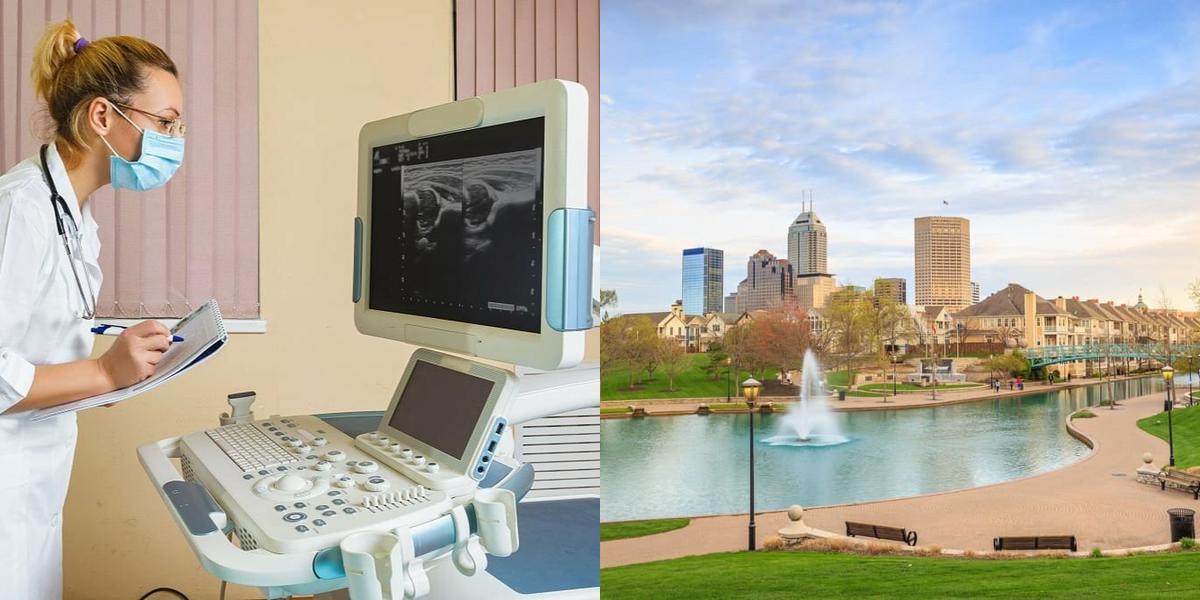How to Become a Medical Sonographer in Indiana

Diagnostic medical sonographer jobs are projected to grow by 11% nationwide, and Indiana offers excellent opportunities in this field. This guide explains how to become a diagnostic medical sonographer in Indiana, covering required education, training programs, certification steps, salary insights, and future job prospects.
Key Points
- A Diagnostic Medical Sonographer is a healthcare professional who uses ultrasound technology to create images of the body for diagnosis and treatment planning.
- To become a Diagnostic Medical Sonographer in Indiana, you must complete an accredited sonography program and earn ARDMS certification.
- It typically takes 2–4 years to finish an associate’s or bachelor’s degree in sonography, depending on your chosen path.
- Medical sonography program costs in Indiana can range from $15,000–$40,000, with financial aid and hospital sponsorships often available.
- The average Diagnostic Medical Sonographer salary in Indiana hovers around $81,140 per year ($39.01 per hour), with top earners making $95,000+.
Where to Find Diagnostic Medical Sonographer Classes in Indiana
You can find accredited programs through community colleges, universities, and private institutions statewide. Dreambound streamlines your search by listing sonography programs in major Indiana cities.
Career Paths and Opportunities
Once you earn your certification and gain some experience, you can pursue various career paths:
- Specializations: Focus on obstetrics, vascular sonography, or echocardiography.
- Advancement: Move into leadership roles, such as department supervisor or program coordinator.
- Education & Research: Transition into teaching sonography or contributing to research studies.
- Management: Oversee the operations of a sonography department, including staff and budgets.
- Travel Sonography: Take short-term contracts around Indiana or beyond, experiencing diverse healthcare environments.
Frequently Asked Questions
How much does a medical sonographer make in Indiana?
According to the Bureau of Labor Statistics, the average diagnostic medical sonographer salary in Indiana is about $81,140 per year, with potential for higher earnings based on experience and specialization.
What colleges offer diagnostic medical sonography in Indiana?
Several colleges in Indiana offer programs in diagnostic medical sonography, including Ivy Tech Community College, University of Southern Indiana, and Indiana University-Purdue University Indianapolis (IUPUI).
How long does it take to become a sonographer?
The time it takes to become a sonographer varies based on the program you choose. Typically, completing an accredited program in diagnostic medical sonography takes about 2 to 4 years, depending on whether you pursue an associate's or bachelor's degree.
What do you need to become a sonographer?
To become a Diagnostic Medical Sonographer, you need to complete an accredited education program, acquire clinical experience, and pass a recognized certification exam such as the ARDMS to show you meet industry standards.
Final Thoughts
Becoming a medical sonographer in Indiana offers a rewarding pathway, especially with an 11% growth outlook for diagnostic medical sonographer jobs. If you’re ready to launch your career, explore accredited programs on Dreambound, connect with schools offering the right fit, and start your journey toward an in-demand healthcare role.
Looking for a better fit? These other articles could be more in line with your expectations if this one isn't precisely what you had in mind:

Athena is Co-founder and CEO of Dreambound.




